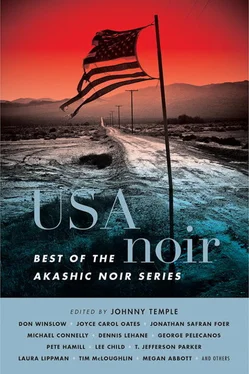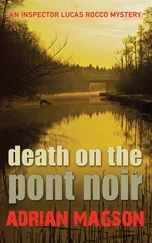Johnny Temple - USA Noir - Best of the Akashic Noir Series
Здесь есть возможность читать онлайн «Johnny Temple - USA Noir - Best of the Akashic Noir Series» весь текст электронной книги совершенно бесплатно (целиком полную версию без сокращений). В некоторых случаях можно слушать аудио, скачать через торрент в формате fb2 и присутствует краткое содержание. Город: New York, Год выпуска: 2013, ISBN: 2013, Издательство: Akashic Books, Жанр: Триллер, Детектив, на английском языке. Описание произведения, (предисловие) а так же отзывы посетителей доступны на портале библиотеки ЛибКат.
- Название:USA Noir: Best of the Akashic Noir Series
- Автор:
- Издательство:Akashic Books
- Жанр:
- Год:2013
- Город:New York
- ISBN:978-1-61775-189-9
- Рейтинг книги:3 / 5. Голосов: 1
-
Избранное:Добавить в избранное
- Отзывы:
-
Ваша оценка:
- 60
- 1
- 2
- 3
- 4
- 5
USA Noir: Best of the Akashic Noir Series: краткое содержание, описание и аннотация
Предлагаем к чтению аннотацию, описание, краткое содержание или предисловие (зависит от того, что написал сам автор книги «USA Noir: Best of the Akashic Noir Series»). Если вы не нашли необходимую информацию о книге — напишите в комментариях, мы постараемся отыскать её.
USA Noir: Best of the Akashic Noir Series — читать онлайн бесплатно полную книгу (весь текст) целиком
Ниже представлен текст книги, разбитый по страницам. Система сохранения места последней прочитанной страницы, позволяет с удобством читать онлайн бесплатно книгу «USA Noir: Best of the Akashic Noir Series», без необходимости каждый раз заново искать на чём Вы остановились. Поставьте закладку, и сможете в любой момент перейти на страницу, на которой закончили чтение.
Интервал:
Закладка:
You’d find him near Stanton Pharmacy with that dog that always followed him around, some scrawny watered-down pit bull he called Strayhorn. The dog always barked at me. It’d go to barking like it wanted to bite me in my kneecaps when I passed and wouldn’t stop until I was down the street. For a long time I thought Amp was whispering sic ’em s in the dog’s dull gray ears, but now I think he was just talking all kinds of mysterious shit to it. That’s why Star liked him. Why she dumped me for him, I guess. She said he had poetry in him.
“I heard they killed the boy’s dog too!” my mother said to her friend Miss Jean as we stood waiting for the 71A. This is what I tried to do every morning: walk my mother to her bus. It was the only time we got to talk since I was usually knocked out by the time she came home from work in the hospital kitchen. I know it sounds like I’m some kind of momma’s boy or that I’m soft-hearted, but it was something my grandmother made me promise to do. In fact, I only started calling my mother “Mother,” instead of “Marie” like I used to, after my grandmother died. I used to call my grandmother “Mother” and my mother “Marie,” because when we all lived together in the East Mall projects, that’s what I heard them call each other. You remember the East Mall? The damn building used to straddle Penn Avenue, cars drove right beneath it. Now that that shit’s been demolished, I almost can’t believe we lived there. I mean, who puts a building right on top of the street? If Penn Circle was the moat, well, the East Mall was like one of its bankrupt castles. No, better yet, it was like an old drawbridge that couldn’t be lowered. Anyway, we were on the fifth floor so I never heard any actual traffic, but when I looked out of my window, I could see the cars going and coming 24/7. I could see the houses in four neighborhoods at once: Shadyside, Friendship, East Liberty, I could see where Penn Avenue curved up the hill to Garfield.
If I had a better sense of Pittsburgh history, I could tell you all the stuff my grandmother used to tell me. I mean in detail. When the civic arena was built in the ’50s, I think it was the ’50s, a lot of blacks were driven from their homes in the Hill District. Some ended up in Homewood or on the North Side, some moved out this way. My grandmother could also tell you, gladly, about all the famous Pittsburgh Negroes from back in the day. Mary Lou Williams. George Benson. And Billy Eckstine, who grew up just a few blocks away in Highland Park. She would sing “Skylark,” which is a song I think he must have made. If she had the record she would have played it all the time, no doubt. Skylark, have you anything to say to me? Won’t you tell me where my love can be? Is there a meadow in the mist, where someone’s waiting to be kissed? It went something like that.
“Yep. They killed the boy and his dog, I can’t believe it,” my mother said this time, bothering a white man with his dress shirt cuffs rolled up to his hairy forearms. He didn’t have a single tattoo.
East Liberty had been plush once, that’s what my grandmother always said. Decorated with big unvandalized houses. But then they dropped a lasso on the neighborhood in the late ’60s. Homeowners moved across town and contracted their shabby cousins and uncles to convert their old places into shabby rental units. The living rooms were the size of bedrooms, the bedrooms the size of closets. Businesses left, the projects came. You know that little strip of Highland Park Avenue between Centre and East Liberty Boulevard that cuts through Penn Circle like the white line on a DO NOT ENTER sign? My grandmother hated it, but that’s where everybody hung out. The blackest block for blocks. After they demolished all the projects and got a Whole Foods and Home Depot and a fancy bookstore, white people started calling it the East End. Fucking changed the name of the part of the neighborhood they wanted back. We still call it Sliberty, though.
My grandmother said the neighborhood was on white people’s minds again. White people young enough to be the grown children of the people who’d left decades ago. Contractors were called to make the apartments houses again. They’d be corralling us like a bunch of Indians, my grandmother said. She said “Native Americans” but I knew what she was talking about. Reservations and Indian-giving and shit. I rarely heard her call people their real names. I once heard her ask this Mexican lady if she preferred “Latino” or “Hispanic.” And sometimes, when she was being sarcastic, she might say “Negro,” but I never heard her used the word “nigga.” She said things like: “Look at these Negroes.” The way she said it sounded worse than “nigga” to me. She was dead with cancer before she had a chance to see me and Marie living on our own for the first time.
“They ain’t kill his dog, it wasn’t that kind of thing,” someone said behind me. It was Benny giving me the wuzzup nod and then flipping open his cell phone.
“People saying it was some plainclothes white cops, but I know it wasn’t cops,” I said to him.
“No, I heard it wasn’t cops too, yo,” he replied, assuming I’d heard it from the same place he had.
“Pranda said they was some old country-looking motherfuckers. Some old long-hair-and-plaid-vests shit. She was ’bout to call the cops about it, but I was like, Them motherfuckers ain’t even been caught yet! They find out you been talking to the PoPo, they coming for you. ” He shook his head while holding the cell phone to his ear. I couldn’t tell if he was talking to me or the person on the other line. “I think they were drug dealers from down south,” he said. “Some old meth heads or some shit. Naw, man, fuck no. I ain’t going back over that bitch house until them motherfuckers get caught!” He laughed into the phone.
Marie. My mom, her bus showed up either just ahead of schedule or just behind it, depending on your perspective. It was never on time. She never said anything like, “Home right after school.” She knew I’d be there. Homework done. Learning more from television than I ever did at school. She kissed me on my face the same way her mother used to kiss me and her. Then she whispered, “My little fish.” I pretended I didn’t hear it. Told her, “Goodbye. Be good.”
I was supposed to walk to school, get there five or ten minutes before the first bell. But I was going to see Amp’s people. His uncle Shag would want to know what I knew. Or I should say, if Shag heard I knew anything, I should see him before he sent someone to find me. Everybody said he was kind of crazy. He didn’t sell drugs or anything, but he’d been in jail a few years for something. Nobody fucked with him.
I wanted to tell Shag what I knew, but first I went back to the alley where, the night before, I’d seen Amp running with the white men right behind him. There was a big old dumpster there. I let my hand rest for a moment on its lid before I opened it and looked inside. The smell crawled over my face. Black garbage bags, white garbage bags, little tiny plastic bags, muddy liquid rot, an old sneaker, a lawn chair—it was all sour. But there was no corpse. No dog, no tat-covered body. Amp had tattoos all along his neck and arms. On the back of each of his hands was his dad’s name and R.I.P. in block letters. As if the man had died twice. Or as if Amp might forget him in the time it took him to look from one hand to the other. I heard he got Star’s name tattooed over his heart as soon as she got pregnant, but I don’t think that shit was true.
When I got to Amp’s house nobody was there. I guess they could have been at the morgue. People said they’d seen the ambulance, the body bag. Everybody noticed when an ambulance or police cars blazed through the neighborhood. I pulled out my phone and looked down the block. New houses were being built along the streets I had passed walking to Amp’s. They stood out like new cars in a junkyard next to the dumps around them. They were big odd-colored places. Light green, light blue, light red wood siding. They looked like empty dollhouses, even the one or two that actually had white people living inside. The FOR SALE signs called them Historic District houses and had prices with six digits. Like whoever was selling them wanted us to know we could never afford them. More old houses were being leveled and more new “historic” houses were being built on top of them. Construction workers, real estate agents, young families, white people were coming and going through the neighborhood’s side streets. It wasn’t a big deal. Nobody was scary or threatening or anything. Sometimes we’d wave when they passed us on the street.
Читать дальшеИнтервал:
Закладка:
Похожие книги на «USA Noir: Best of the Akashic Noir Series»
Представляем Вашему вниманию похожие книги на «USA Noir: Best of the Akashic Noir Series» списком для выбора. Мы отобрали схожую по названию и смыслу литературу в надежде предоставить читателям больше вариантов отыскать новые, интересные, ещё непрочитанные произведения.
Обсуждение, отзывы о книге «USA Noir: Best of the Akashic Noir Series» и просто собственные мнения читателей. Оставьте ваши комментарии, напишите, что Вы думаете о произведении, его смысле или главных героях. Укажите что конкретно понравилось, а что нет, и почему Вы так считаете.












